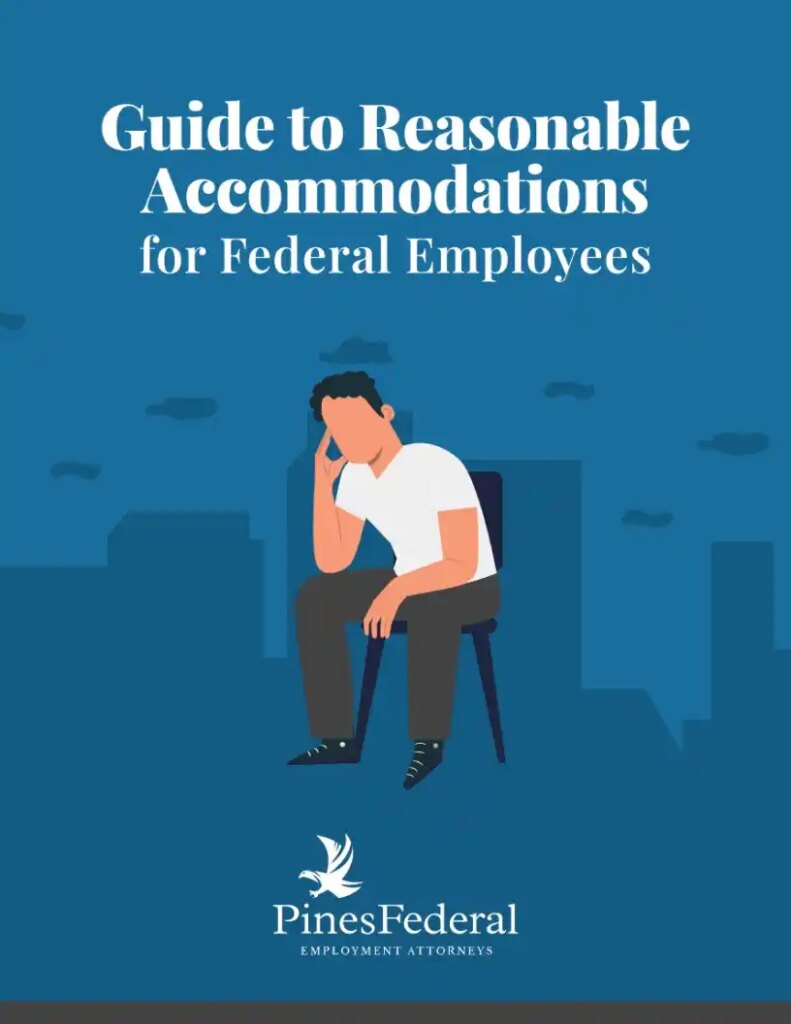
We hear the word “anxiety” more often, but not everyone understands its impact.
There are many different anxiety disorders, including generalized anxiety disorder, panic disorder, and social anxiety disorder.
Collectively, anxiety disorders are the most common mental issues in the United States. They affect almost 20% of the adult population.
As the attitudes towards anxiety evolve, federal employees’ reasonable accommodation for anxiety is becoming more common. Such employees can benefit from a wide range of reasonable accommodations.
In this piece, we’ll answer many of the basic questions we receive regarding anxiety. However, this is only general information.
To receive tailored legal advice and learn about your options, contact our team of incredible EEOC reasonable accommodations attorneys. Reach out to us online or call (800) 801-0598 today to get started.
Is Anxiety a Disability Under the ADA?
The short answer is yes. According to the Americans with Disabilities Act Amendment Act of 2008, the government is under a clear mandate to provide a very broad interpretation of the phrase “disability.”
Specifically, the term “disability” now means any medical or physical impairment that substantially limits one or more major life activities of an individual.
Major life activities include things like:
- Performing manual tasks,
- Seeing,
- Bending,
- Speaking,
- Breathing,
- Reading,
- Thinking,
- Learning,
- Communicating, and
- Working.
“Disability” under the ADAAA also includes any individual with a record of an impairment or who is “regarded as having such impairment.” Because anxiety can affect virtually every major life activity, it qualifies as a disability.
[DOWNLOAD] Reasonable Accommodations for Federal Employees

Applying the ADA: Anxiety Accommodations
Because anxiety (and anxiety disorders) qualify as a disability under the ADA, employees can request reasonable accommodation to help manage it.
However, few federal employees understand the reasonable accommodation process. In fact, many agencies fail to properly educate their own human resources officials about the accommodation request process.
The reasonable accommodation process begins when you make your request. You can do this simply by indicating a need for accommodation to your supervisor.
The ADA does not require that you use any formulaic legal phrases or invoke the law to make the request. Any “plain English” request will suffice. This could be something as simple as telling your supervisor that you need time off to treat your anxiety.
Once you make this statement, your employer is on notice that you have made a reasonable accommodation request.
Ideally, your employer will provide you will a detailed accommodation form which you can fill out to indicate things like:
- The anxiety disorder you have;
- How your anxiety disorder affects you; and
- What you are seeking as accommodation.
Once you have completed this form, your employer should meet with you to review your request, discuss the process, and go over the next steps.
The ADA requires that you receive reasonable accommodation for your disability unless your employer is able to show that your accommodation is an undue burden.
However, your employer only has to provide you with accommodation that allows you to perform your core duties. It does not have to provide you with the accommodation of your choice.
Examples of Work Accommodations for Anxiety
Federal employees have several options for reasonable accommodations for anxiety.
Reasonable accommodations examples include:
- Additional leave,
- A modified work schedule,
- A service animal,
- Noise-canceling headphones,
- A quiet office,
- Occasional telework, and
- Memory aids.
Depending on your symptoms and needs, you could qualify for other accommodations as well. In some cases, full-time work from home as accommodation for anxiety might be reasonable.
In addition, federal employees may request a transfer to a different department or team within the agency to reduce interactions with a triggering supervisor or manager. You can request flexible work arrangements, such as telework or flexible hours, to reduce the amount of time spent in direct contact with triggering situations or people.
Federal employees can also seek support from employee assistance programs (EAPs) or counseling services offered by their agency. These services can provide coping strategies and support for dealing with anxiety.
Limitations on Reasonable Anxiety Accommodations for Federal Employees
Under federal law, employees with certain characteristics or disabilities are entitled to reasonable accommodations to be able to perform essential job functions. The ADA defines a disability as a physical or mental impairment that substantially limits one or more major life activities.
But is anxiety a disability under the ADA? If your anxiety meets the definition under the law, accommodations for your anxiety may be required. However, the focus of reasonable accommodations is typically on enabling the employee to perform their job duties despite their disability rather than addressing the specific source of their anxiety.
For example, if an employee’s anxiety substantially limits their ability to perform in-office tasks but they can effectively work from home, they may request a work-from-home accommodation for their anxiety under the ADA.
This request should be supported by documentation from a healthcare provider. Your employer must then engage in an interactive process to determine if the accommodation is feasible and does not pose an undue hardship. If working from home is a reasonable accommodation, the employer must provide it unless doing so would cause significant difficulty or expense.
Some alternative accommodations for anxiety that federal employees can request include changes in job duties, flexible work hours, or workspace modifications. Federal employees can initiate a discussion with their supervisor and submit a formal request for accommodations.
These accommodations should be framed in terms of managing the pre-existing condition of anxiety rather than avoiding a specific trigger like a supervisor or manager. While accommodations for anxiety disorders are possible under the ADA, accommodations specifically targeted at alleviating anxiety caused by a supervisor or manager may not be covered.
What If a Reasonable Accommodation Request Is Denied?
If an employee’s request for a reasonable accommodation is denied, they can take several steps. First, you should request an internal review, as some employers have procedures for reconsidering denials.
If the denial appears to violate the ADA or other laws, the employee can file a complaint with the Equal Employment Opportunity Commission (EEOC) or their state’s fair employment practices agency.
Seeking legal advice from an employment lawyer who specializes in employment law and disability rights can also help clarify the situation and determine if legal action is warranted.
It’s important for employees to document all communications and decisions related to their accommodation request for potential legal proceedings.
We’re Dedicated to Making Anxiety Reasonable Accommodations for Federal Employees Happen
The ADA provides those with anxiety significant rights and options. However, not all employers are up-to-date on their obligations.
In some situations, you may encounter discrimination and harassment because of your anxiety disability. Or your employer may not take your request for accommodation seriously.
If you think you need legal assistance with your request, don’t hesitate. Obtain the legal representation you deserve today.
Our team at Pines Federal is passionate about the rights and welfare of federal employees. We understand how nerve-wracking anxiety can be.
We also know that the process surrounding reasonable accommodation is often far from straightforward. Thankfully, our attorneys are very familiar with anxiety-related accommodation requests.
We also have decades of experience working with federal employers. When you hire us, we will strive to make the reasonable accommodation process as quick and painless as possible.
Don’t wait. Give us a call today at (800) 801-0598 or reach us online to set up your initial appointment.